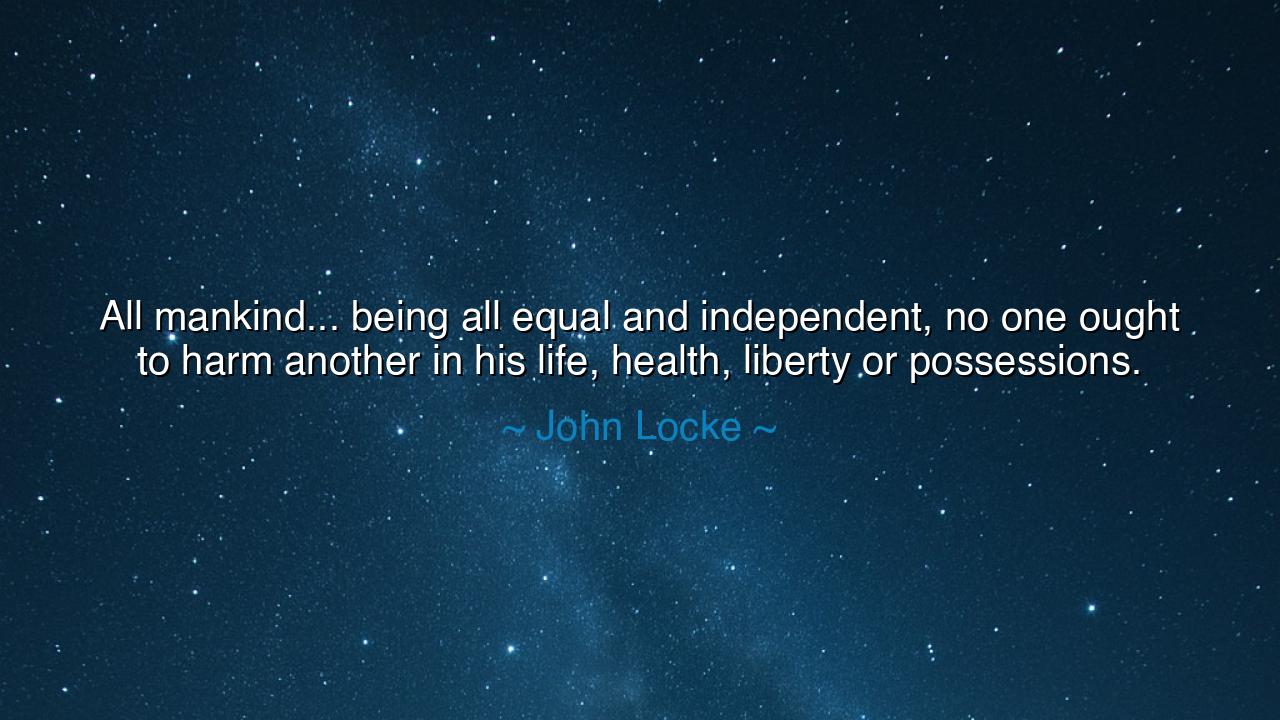
All mankind... being all equal and independent, no one ought to
All mankind... being all equal and independent, no one ought to harm another in his life, health, liberty or possessions.






The words of John Locke, “All mankind... being all equal and independent, no one ought to harm another in his life, health, liberty or possessions,” are not merely a sentence from a philosopher’s pen—they are the sacred foundation upon which the modern idea of human dignity rests. In these few words, Locke captured the essence of what it means to live justly among others: that every human being, by virtue of existence alone, possesses an inherent right to life, to freedom, to health, and to the fruits of their labor. These rights are not granted by kings or governments; they are bestowed by nature, and to violate them is to wound the moral order of the world itself.
Locke wrote these words in the 17th century, an age torn between monarchy and the awakening of freedom. His masterpiece, The Second Treatise of Government, was a call to reason in a time when divine right and tyranny still ruled the hearts of men. Against this darkness, he lit a torch: the belief that all people are born equal and independent, bound not by chains of birth but by a moral law written into the fabric of creation. The origin of this quote lies in his conviction that a just society could not stand on oppression, but only upon the recognition that every soul possesses the same claim to life and liberty as any other.
What Locke proposed was revolutionary. In an age where kings owned lands and men alike, he declared that the individual, not the monarch, is the measure of political morality. His ideas became the soil in which the great revolutions of the modern world took root. The American Declaration of Independence, written a century later, bears the echo of Locke’s voice: “All men are created equal... endowed by their Creator with certain unalienable Rights.” It was his teaching that gave rise to governments that exist not to command, but to protect; not to dominate, but to defend the sacred trust of human life.
Consider the life of Dr. Martin Luther King Jr., who centuries later embodied Locke’s vision in flesh and voice. King did not demand privilege—he demanded recognition of what was already divinely his. “We hold these truths to be self-evident,” he cried, echoing Locke’s ancient wisdom, “that all men are created equal.” His march for life, health, liberty, and possessions—for the right to live free of fear, to walk unharmed, to work and rest in dignity—was a continuation of Locke’s eternal philosophy. And in his peaceful resistance, King proved that true independence is not rebellion against others, but alignment with the moral law of equality that governs all.
Locke’s words also speak to the moral health of humanity. He does not merely prohibit harm—he calls for reverence. To violate another’s life or liberty is to desecrate what is sacred. The murderer destroys his own humanity; the tyrant chains his own soul. Equality, in Locke’s eyes, is not sameness, but mutual respect—the understanding that each life is a reflection of the same divine light. In this sense, his teaching is not political alone, but spiritual. The one who honors the liberty of others safeguards his own.
But Locke also understood the peril of forgetting this truth. When greed or fear blinds men to the equality of their neighbors, societies rot from within. Every injustice—slavery, colonization, exploitation—has been born from the denial of what Locke proclaimed. Yet every movement of renewal—abolition, democracy, human rights—has arisen from its rediscovery. To harm another’s life, health, liberty, or possessions is to violate the harmony of creation itself; to protect them is to act as a guardian of civilization.
The lesson for all who hear these words is clear: do not measure others by wealth, nation, or belief, but by their shared humanity. Protect the weak, for in them lies the same dignity as in kings. Speak against oppression, for silence allies with cruelty. Live justly, that your strength may serve life, not harm it. For as Locke teaches, every human is both equal and independent, yet bound by moral duty to the same eternal law: that we do no harm to one another, but preserve and uplift the lives entrusted to our care.
Let this teaching endure as the law of the ages: to honor life is to honor the divine, to preserve liberty is to preserve one’s own soul. The just man harms none, the wise man enslaves none, and the noble heart sees in every other being the reflection of his own sacred freedom.






AAdministratorAdministrator
Welcome, honored guests. Please leave a comment, we will respond soon